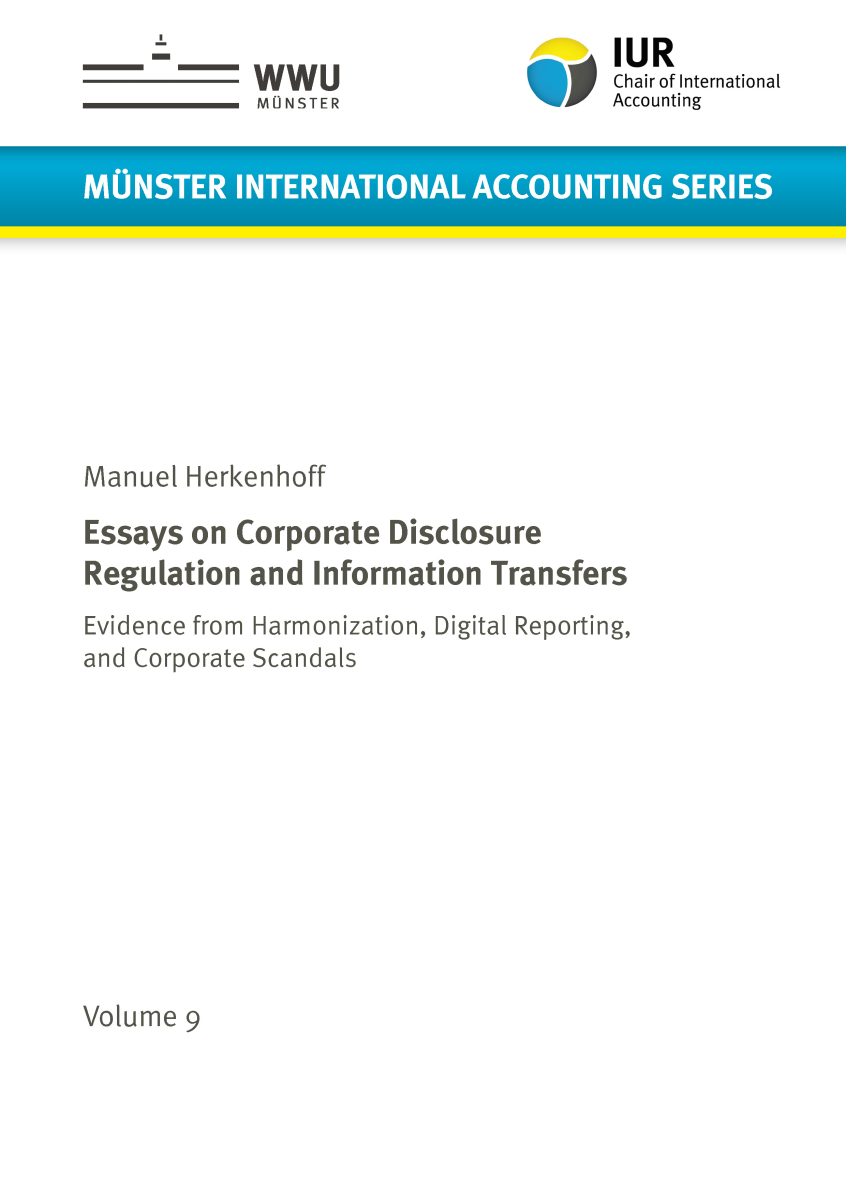Volume 9
Manuel Herkenhoff - Essays on Corporate Disclosure Regulation and Information Transfers - Evidence from Harmonization, Digital Reporting, and Corporate Scandals
 Corporate disclosure, its regulation, and the information needs of capital market participants and other stakeholders are dynamic because the corporate reporting landscape is constantly evolving. Although potential market-wide benefits are central to the economic justification of disclosure regulation, most of the studies on financial reporting and corporate disclosure regulation have concentrated on examining the economic consequences on an individual firm level. However, corporate disclosure effects extend beyond the disclosing firm through information transfers. Thus, the three papers in this thesis examine market-wide effects of corporate disclosure regulation in light of the three megatrends globalization (study 1), digitalization (study 2) and sustainability (study 3).
Corporate disclosure, its regulation, and the information needs of capital market participants and other stakeholders are dynamic because the corporate reporting landscape is constantly evolving. Although potential market-wide benefits are central to the economic justification of disclosure regulation, most of the studies on financial reporting and corporate disclosure regulation have concentrated on examining the economic consequences on an individual firm level. However, corporate disclosure effects extend beyond the disclosing firm through information transfers. Thus, the three papers in this thesis examine market-wide effects of corporate disclosure regulation in light of the three megatrends globalization (study 1), digitalization (study 2) and sustainability (study 3).
The first study (“Do Investors Overestimate Comparability Benefits of Financial Reporting Harmonization”) examines how financial reporting harmonization affects investors’ use of peer-firms’ earnings information for investment decisions. Using a large global panel dataset, the study finds that financial reporting harmonization is associated with investors overreacting to peer-firms’ earnings announcements, likely because of overestimated comparability benefits.
The second study (“The Effect of Digital Financial Reporting on Information Transfers – Evidence from the SEC’s XBRL Mandate”) investigates market-wide effects from the implementation of a standardized digital financial reporting format. The results show that firms reporting under the standardized digital reporting format are subject to reduced investor overreactions in response to peer firms’ earnings signals and experience lower excess volatility around earnings announcements. The results show that digital reporting formats using the standardized XBRL taxonomy can improve the processing of information transfers in capital markets.
The third study (“CSR Disclosure and the Contagion Effects of Corporate Scandals”) explores the consequences of corporate scandals on peer firms with different CSR disclosure levels. The empirical results show that negative firm value consequences for firms causing a corporate scandal spill over to other firms in concentrated industries and cause measurable declines in peer firms’ stock market valuations. However, this contagion effect is significantly reduced for firms with more extensive CSR disclosures prior to the respective corporate scandal.
Collectively, the three studies in this thesis provide helpful insights into the market-wide effects of corporate disclosure and its regulation on information transfers against the backdrop of current megatrends. This is particularly important for the work of standard setters in further developing the regulation of corporate disclosures.


